“Just because the Supreme Court has overturned this order doesn’t mean cities should just go into a mode of being reactionary and criminalizing people for biological necessities,” she said. “Particularly in Chicago and Illinois, I think there is a recognition that criminalization is not effective. A housing first approach is effective and that seems to be the direction that people here want to move.”
Patricia Nix-Hodes, director of CCH’s The Law Project.
Chicago Tribune: In Chicago’s tent cities, ‘a multitude of challenges’ to address the city’s rising homelessness

Two women, who asked not to be named, tend to a kitten dropped off at their tent encampment at a rail underpass in the 3000 block of West Chicago Avenue on June 25, 2024, in Chicago. (John J. Kim/Chicago Tribune)
Robert Bulanon glanced at the sky and frowned at the rain. He hurried into his home and emerged, holding an umbrella over his head, picking his way between a barbershop pole, a pair of bus seats, a wheelbarrow, a grill where another man was cooking beef stew, and other objects scattered along the embankment of the canal.
Bulanon, 52, is one of about 20 people who live in a set of makeshift shelters along the North Shore Channel between Foster and Bryn Mawr avenues on Chicago’s Northwest Side. A ladder leaned against the chain link fence, separating the river embankment from athletic fields at Northside College Prep, a selective enrollment high school.
By July 30, the residents will no longer be able to call the longtime encampment home. The next day, city departments are scheduled to begin clearing the tents and items, officials said, offering the group non-congregate shelter placement at a downtown hotel. Notices will go up starting the first week of July. The idea of relocating them has been talked about for years.
“They said, ‘We’re here to help; we could send you somewhere, a shelter or something,’” Bulanon recalled of his first interaction with the city.
Months after voters rejected the Bring Chicago Home referendum, which sought to raise millions for homelessness services by raising the city’s real estate transfer tax for property sales above $1 million, Chicago is at a critical juncture on how to address its rapidly growing homeless population.
The city has historically prioritized finding housing for its homeless, many of whom reside in tent cities across its parks and under bridges. But with low affordable housing stock, depleted federal and state funding and other challenges, the city’s number of homeless is outpacing what the city can provide.
CCH’s Response to the Supreme Court’s Decision to Criminalize Street Homelessness

Chicago Coalition for the Homeless (CCH) is deeply disappointed that the U.S. Supreme Court limited the rights of people experiencing homelessness in a decision in the Johnson v. Grants Pass case.
Originating from Grants Pass, Oregon, the Supreme Court decision allows cities to penalize people for sleeping outdoors if they have even a blanket to stay warm, even when they have nowhere else to go. Lower court decisions in the case found that fining and arresting people in those circumstances was “cruel and unusual punishment” under the 8th Amendment of the United States Constitution.
The Court’s decision does not recognize the reality of the lived experience of people who have no place else to go. As noted in the first sentence of Justice Sotomayor’s dissent, “Sleep is a biological necessity, not a crime.”
There is a severe shortage of affordable housing in Chicago, Illinois, and throughout the country and a lack of emergency shelter to address the need. Anti-bedding ordinances, like those at issue in the case, would be particularly harmful to people experiencing homelessness in climates like Chicago and Illinois. Any such measures passed here would punish Black Chicagoans and Illinoisans, who disproportionately experience homelessness.
“Fining and penalizing people experiencing homelessness does not solve homelessness. Indeed, criminalizing homelessness only serves to exacerbate it,” said Patricia Nix-Hodes, Director of the Law Project of CCH. “The solution to homelessness is to provide permanent affordable housing.”
CCH, alongside 27 partner organizations, filed an amicus brief in the case, raising the importance of the case and the impact on people experiencing homelessness in Chicago and Illinois. Pro bono partner Much Shelist supported CCH in filing the brief, and attorneys Steven Blonder, Josh Leavitt, and Charlotte Franklin were instrumental in drafting the brief. Legal Council for Health Justice and Law Center for Better Housing also partnered on the brief.
CCH joined the National Homelessness Law Center and hundreds of other organizations that submitted more than 40 amicus briefs in support of people experiencing homelessness.
Amicus brief partners: AIDS Foundation Chicago, All Chicago Making Homelessness History, BEDS Plus, Inc., Chicago Coalition for the Homeless, Chicago Rehab Network, Chicago Urban League, Chicago Women Take Action, Covenant House Illinois, Deborah’s Place, Farmworker and Landscaper Advocacy Project, Healthcare Alternative Systems, Inc, Heartland Alliance Health, Housing Action Illinois, Illinois Public Health Institute, Impact for Equity, James B. Moran Center for Youth Advocacy, Law Center for Better Housing, Legal Council for Health Justice, LYTE Collective, North Suburban Legal Aid Clinic, Organized Communities Against Deportations, Red Line Service Institute, Safer Foundation, South Suburban PADS, Street Samaritans, The Network: Advocating Against Domestic Violence, The Night Ministry, and Thresholds.
South Side Weekly: ‘Everyone Is Mad at the Wrong People’: Black Organizers Call for Focus and Nuance in the Affordable Housing Blame Game
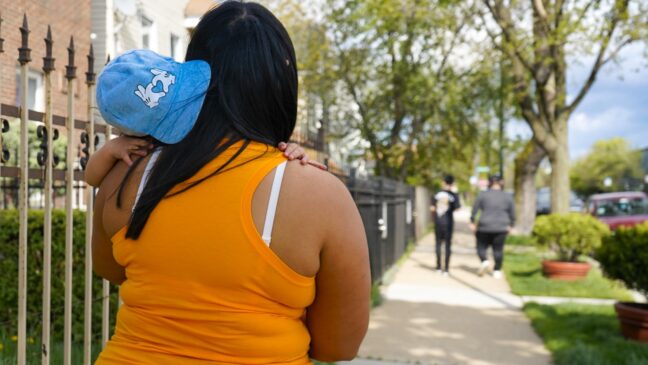
By Wendy Wei and Leslie Hurtado, April 29, 2024
While anti-migrant sentiments have been expressed by many Chicagoans of different backgrounds, much media focus has been on the Black community’s historical tension with Latinx communities. However, lifelong Black housing advocates say that the energy spent on anti-migrant protests could be more productively used if it was channeled toward addressing the root causes of housing instability in the city.
According to DePaul’s Institute for Housing Studies, in 2021, before the first bus arrived from Texas, the city was already short 120,000 affordable housing units to accommodate Chicago’s low-income renter households.
That same year, the Chicago Department of Family and Support Services counted 3,000 people in shelters, and 702 sheltering on the street (though this number could be as high as 1,500). 73 percent of this population was Black.
Street homelessness is only part of the picture. In 2021, the Chicago Coalition for the Homeless estimated that 68,440 people were experiencing homelessness in Chicago, with most temporarily staying with others, or “doubling up.” In their report, Black Chicagoans made up more than half of the total population experiencing homelessness.
Hendricks says that frustrations have been brewing since the 2008 Great Recession, and were worsened by the COVID-19 pandemic, during which Black Chicagoans faced severe disparities. Despite constituting about 30 percent of the city’s population, they accounted for 60 percent of its COVID-19 fatalities and a quarter of Illinois’ confirmed cases.
“Because poor people were under a lot of stress and pressure, when they see somebody getting a resource, and they know they’ve been denied some space, they blame those folks and they blame the people who are providing them with those resources. And it becomes a racial tension,” Washington said. “So that’s a misunderstanding of the real situation.We have two crises. A migrant crisis and a housing [crisis].”
Chicago Defender: Legacy of Inequitable Housing Access–How a Black Family’s Story Echoes Today’s Fight
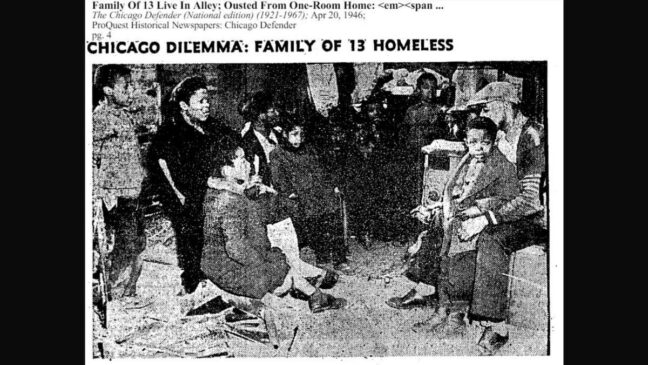
By Tacuma Roeback, Chicago Defender Managing Editor
Thanks to the efforts of Carl Hansberry and later the Dr. Martin Luther King Jr., James Bevel, and Al Raby-led Chicago Freedom Movement, the Fair Housing Act of 1968 was ratified, and restrictive covenants were outlawed. What Chicago’s unhoused population and those on the verge of losing their homes face today is similar to what the Hemmons family endured back in 1946. But politics and entrenched segregation by race and class do the work restrictive covenants once did.
Moreover, organizations that advocate for the homeless and affordable housing argue that Chicago residents recently had an opportunity to vote for a transfer tax known as Bring Chicago Home that would’ve helped to change the fortunes of thousands of unhoused persons and those on the verge of losing their homes.
Instead, the March 19 ballot measure was soundly defeated.
With that setback, a familiar theme prevailed, one that governed the lives of families like the Hemmons and thousands of others, especially those who were Black and poor.
“The powers that be have always pushed back on efforts to make access to housing more just because it undermines their profits and their power,” said Douglas Schenkelberg, executive director of the Chicago Coalition for the Homeless. “And so the loss of the referendum question (Bring Chicago Home) is yet another example of the status quo working to maintain the status quo.”
Bring Chicago Home sought to help two groups: people already unhoused and in need of shelter and those on the verge of losing their homes.
According to proponents, BCH would have incrementally raised the city’s real estate transfer tax on properties valued at more than $1 million. The transfer tax would have generated $100 million yearly for mental health services, job training and educational opportunities for the unhoused. Schenkelberg said BCH monies would have funded two large-scale solutions that would effectively address homelessness in the city.
For Schenkelberg and many who work on behalf of the unhoused in Chicago, the great dilemma is knowing that programs that can effectively address homelessness exist but that there isn’t a sustainable funding stream to address large-scale homelessness in the city.
“Are we investing funding at scale in these proven solutions that we can have a measurable impact on the problem?” Schenkelberg said.
As for the business and real estate interests that opposed BCH, Schenkelberg poses this challenge:
“You’ve said multiple times throughout the campaign and after election day that you think addressing homelessness is a very important issue, that it’s something we have to tackle in the city of Chicago,” he said.
“So how are you going to step up in a way that’s meaningful and has a measurable impact on the 68,000 people experiencing homelessness in Chicago? How will you show up differently than you’ve shown up before Bring Chicago Home?”
This time around, the fight still centers around BCH, which supporters contend is not dead.
They vow not to give up.
They believe they have a measure that could disrupt a persistent narrative and resolve a problem that has impacted Black people the most.
“There were 68,000 people experiencing homelessness before Election Day, and there are 68,000 people experiencing homelessness after it, so one election doesn’t change our course over the long term,” said Schenkelberg.
“The work goes on, and we only honor the people who have fought for this for years by continuing to do the work.”
Chicago Tribune: Chicago to have one unified shelter structure for homeless and migrants, city and state officials say
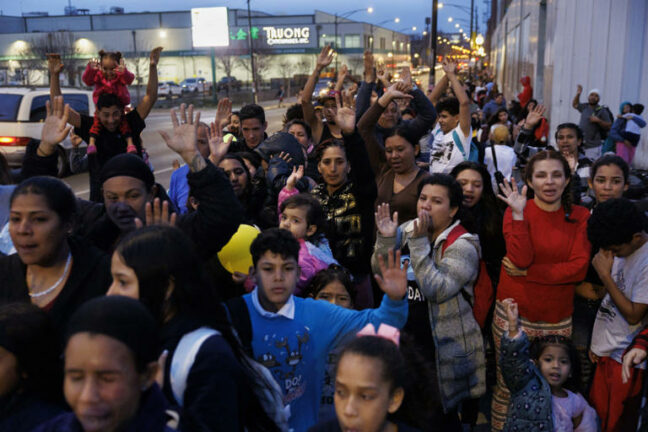
By Nell Salzman, April 22
The city and state are in the planning stages to combine Chicago’s legacy homeless shelter system with its system for migrants, according to government officials, and turn it into a unified shelter structure, an idea advocates for the homeless have long championed.
Sam Paler-Ponce, interim associate director of policy for the Chicago Coalition for the Homeless, said combining the systems is a “move in the right direction.” The biggest benefit, he said, is that asylum-seekers will have a wider array of supportive services made available to them: employment, food and health care.
But combining the systems could also lead to an “influx in shelter bed demand,” he said.
According to recent data from the organization, there are more than 68,000 people currently experiencing homelessness in Chicago. Nearly 37,000 people accessed homeless services throughout the year. These figures don’t include migrants.
WBEZ: A U.S. Supreme Court case could affect homeless people in Chicago and Illinois
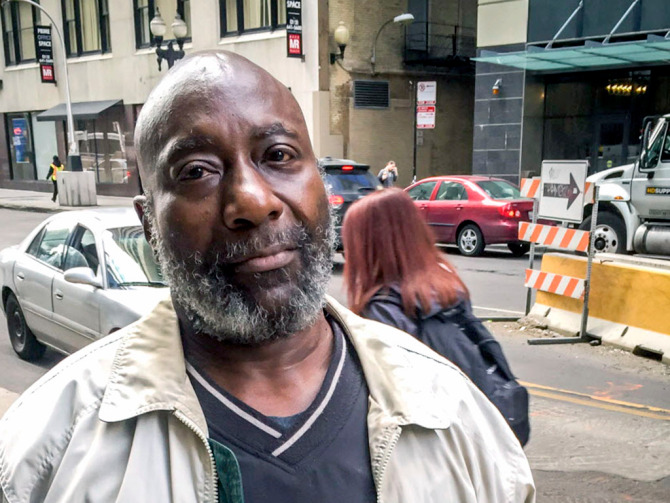
By Esther Yoon-Ji Kang, April 11, 2024
In 2015, Robert Henderson returned from panhandling to the viaduct under which he was sleeping on Chicago’s West Side. He was unhoused at the time.
“When I came back, I saw a blue garbage truck,” recalled Henderson, now 70. “When I finally looked around, everything that I owned at that particular time was thrown in the garbage truck.”
His belongings included blood pressure medicine, his Social Security and Medicaid cards, a copy of his birth certificate, family photos and clippings of loved ones’ obituaries.
With help from the Chicago Coalition for the Homeless, Henderson sued and settled a case against the city of Chicago on the grounds that tossing his belongings violated Illinois’ Homeless Bill of Rights, enacted in 2013.
Now, Henderson, who has lived in a Chicago Housing Authority apartment for the past seven years, is using his experience to speak out against a high-profile case on the U.S. Supreme Court docket.
Logan Center: Many of the city’s homeless are not on the streets on a rainy winter night
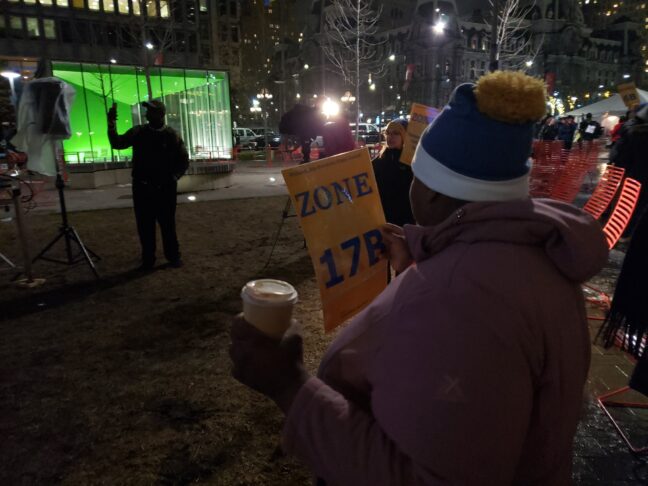
By Allison Beck and Julius Philp, April 9, 2024
Multiple studies in cities across the country, including New York City, Chicago and Houston, have shown that not only does the PIT count miss people that it is intended to capture, but it excludes those living in their cars or abandoned buildings and those in temporary living situations like motels and doubling up.
Doubling up is one of the most common ways that people experience homelessness. It happens when a person or group of people are unable to afford their own housing and are forced to live with others, often leading to overcrowding. It’s also one of the experiences of homelessness that isn’t considered in the point in time count, which is why researchers from the Chicago Coalition for the Homeless and Vanderbilt University created a way to measure it using publicly available data.
“We’ve seen doubled up homelessness is starting to be funded alongside street and shelter homelessness,” said Sam Paler-Ponce, the interim associate director of city policy at the Chicago Coalition for the Homeless. “I don’t think that would have been as possible without a measure to describe the total scope.”
Want to help win Bring Chicago Home on March 19? Here’s how to vote if you are experiencing homelessness
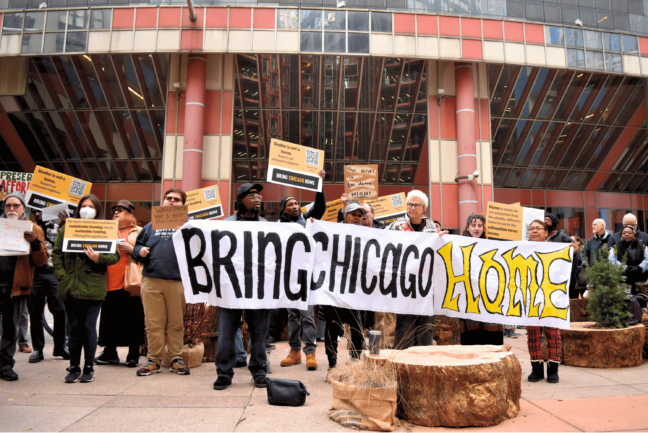
The Importance of Voting
This upcoming election holds a special significance for Chicago Coalition for the Homeless. In addition to voting on key races at local and national levels, at the end of the ballot, you will find a referendum question – known as Bring Chicago Home or Ballot Question One – which would give the city the authority to restructure the city’s real estate transfer tax (the one-time tax paid when a property is bought) so that anyone buying a property for under $1 million would pay a lesser rate, and anyone buying a property for over $1 million would pay a marginally higher rate. All the new funds from the real estate transfer tax would be legally dedicated toward affordable housing and supportive services to prevent homelessness.
This moment has been years in the making. After years of organizing to create a dedicated stream of funding to address homelessness by amending the real estate transfer tax, the Bring Chicago Home coalition – convened by Chicago Coalition for the Homeless – successfully lobbied City Council to put a referendum question to authorize the restructuring of the real estate transfer tax on the ballot. The ballot question is a necessary legal step to pass an ordinance in City Council to implement Bring Chicago Home’s proposal.
Despite an initial court ruling suppressing the vote on the ballot, on March 6th that decision was overturned. This means that on March 19th – you will have the opportunity to vote on a proposal that would dramatically shift how Chicago addresses its housing and homelessness crisis. You have an opportunity to help Bring Chicago Home by voting YES on Ballot Question One.
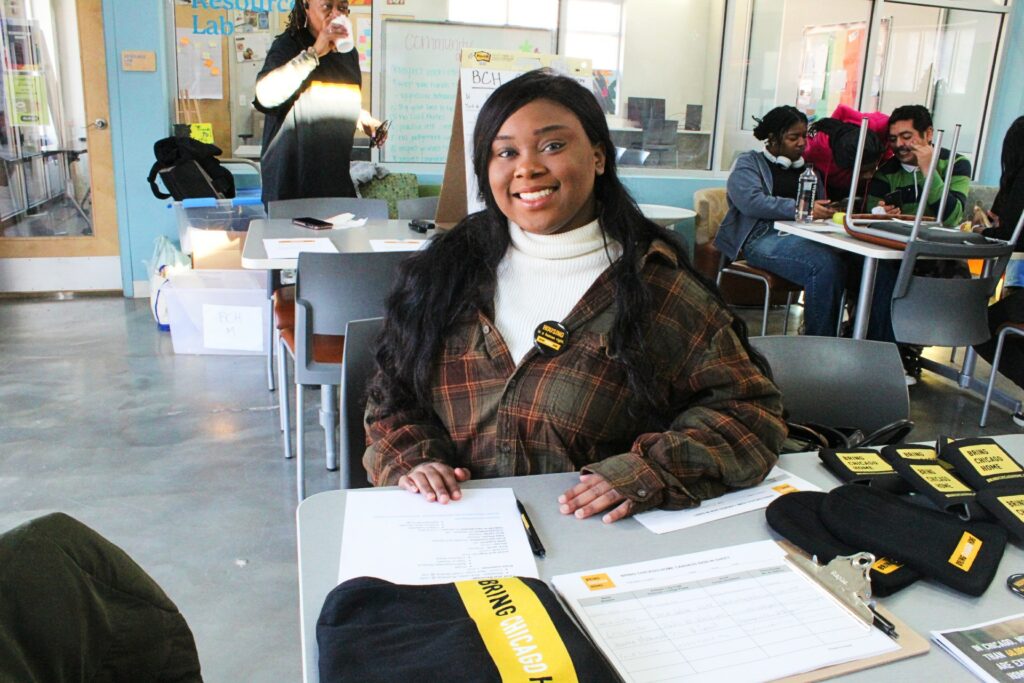
Voting While Experiencing Homelessness
All people experiencing homelessness – whether they are street-based, living in shelters, or doubled-up in the homes of others – have the right to vote. This right is protected by state and federal laws, including the 2013 Illinois Bill of Rights for the Homeless Act.
You can check online to see if you are registered here.
You can register to vote at an Early Voting Site OR on Election Day!
Any Illinois resident ages 18 or older can register to vote on Election Day at the precinct polling place assigned to their residential mailing address. Chicago residents can also register at the Loop Super Site located downtown.
You are required to bring two (2) forms of identification (ID) when registering to vote on-site, including one that shows proof of residence or a mailing address. Acceptable forms of ID include mail postmarked to the applicant; an Illinois driver’s license or state ID card; a municipal ID card (for example, the Chicago CityKey); an employee or student ID; Social Security card; birth certificate; credit card; valid U.S. passport; and lease or rental contract.
Illinois residents who are homeless have the right to vote in all local, state, and national elections, including the upcoming Primary Election on March 19th. Polls are open from 6 a.m. to 7 p.m. Illinois permits residents to vote early and request to vote by mail without providing an excuse or reason for this request. Also, Illinois residents can vote on Election Day even if they are not yet registered to vote.
As one form of ID, a person experiencing homelessness can provide a letter from a drop-in center, shelter, or the person in whose home they are living doubled-up. The letter must confirm that the named person has permission to use the address to register to vote.
To register to vote, you must be a U.S. citizen, at least 18 years old on or before Election Day, and not claim the right to vote elsewhere.
You cannot vote if you are currently incarcerated for a conviction. But, if you are in pre-trial detention and have not been convicted, you remain eligible to vote. Learn more about how to vote in pre-trial detention.
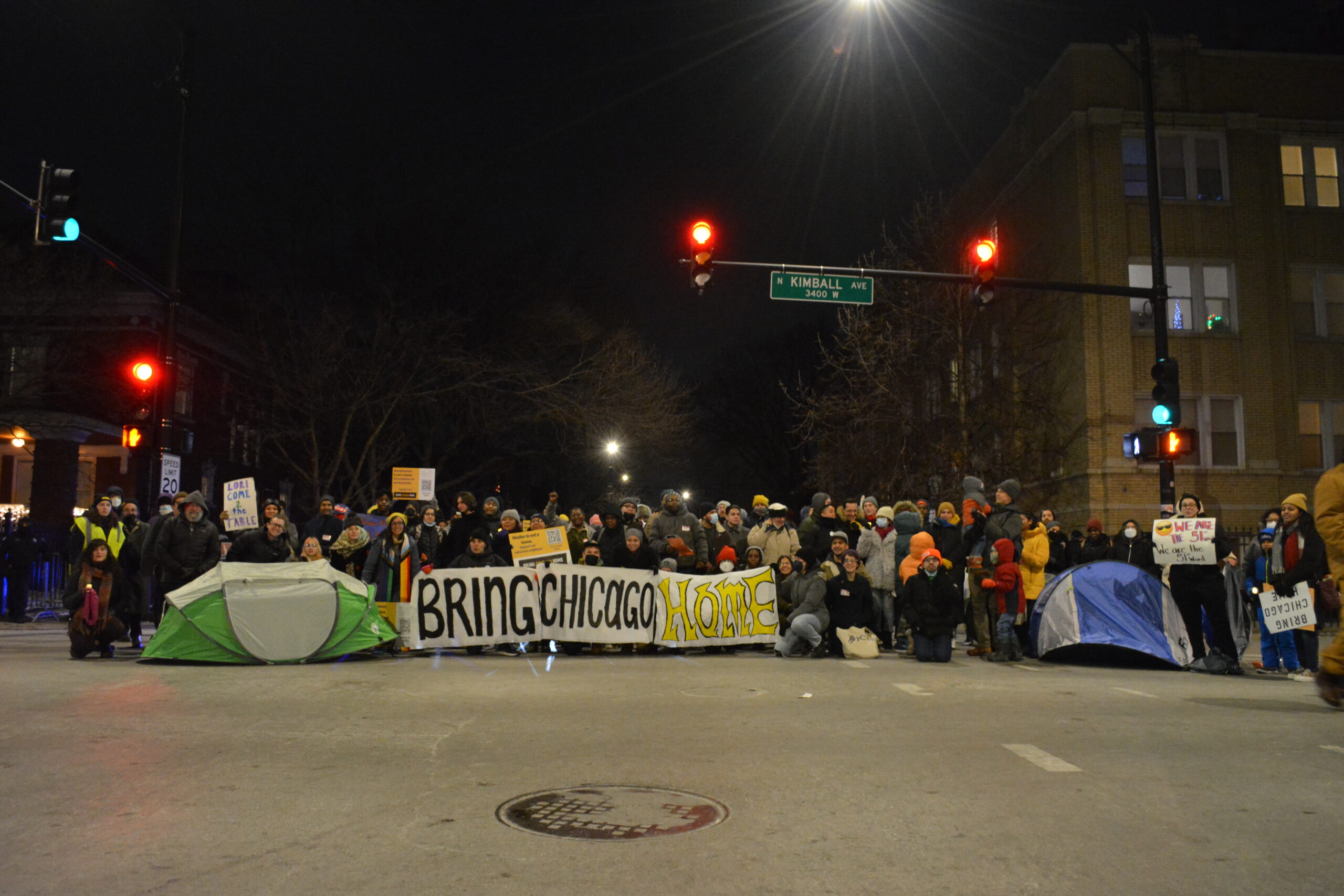
When is ID needed and not needed to vote?
Identification is not necessary if the person experiencing homelessness has already registered to vote at the polling place; the signature they provide matches the one on file; and an election judge does not challenge the person’s right to vote.
But identification is necessary in these situations:
- They registered by mail and did not include the Illinois ID/driver’s license number or Social Security number.
- An election judge challenges the person’s right to vote. Please note: A common reason for challenging a person’s right to vote occurs after the Board of Elections has sent mail to verify a voter’s mailing address, but the mail was returned.
- The individual is registering to vote on-site (see above)
If a voter needs to show ID but is unable to do so, they may cast a provisional ballot. For that provisional ballot to be counted, the voter must present ID within seven (7) days of the election to the Board of Elections.
Voting after a recent move, whether homeless or housed
If you moved within the same precinct within 27 days of the election, you can vote a full ballot by signing an affidavit.
If you moved outside of your precinct more than 30 days before the election and did not register in your new precinct, you may grace-period update your registration through Election Day, and then grace-period vote.
If you moved outside of your precinct less than 30 days before the election, but still live in Illinois and did not transfer your registration, you may grace-period update your registration to your new address through Election Day and grace-period vote. Or, you can vote a full ballot in your old polling place after completing an affidavit.
For Election Day assistance, call these legal help desks:
- Chicago Board of Elections, (312) 269-7870
- Cook County Clerk Karen A. Yarbrough office, (312) 603-0236
- Illinois State Board of Elections has phone numbers in Chicago at (312) 814-6440, and in Springfield at (217) 782-4141. Operators will be standing by until 11 p.m. in Chicago and until 12 midnight in Springfield.
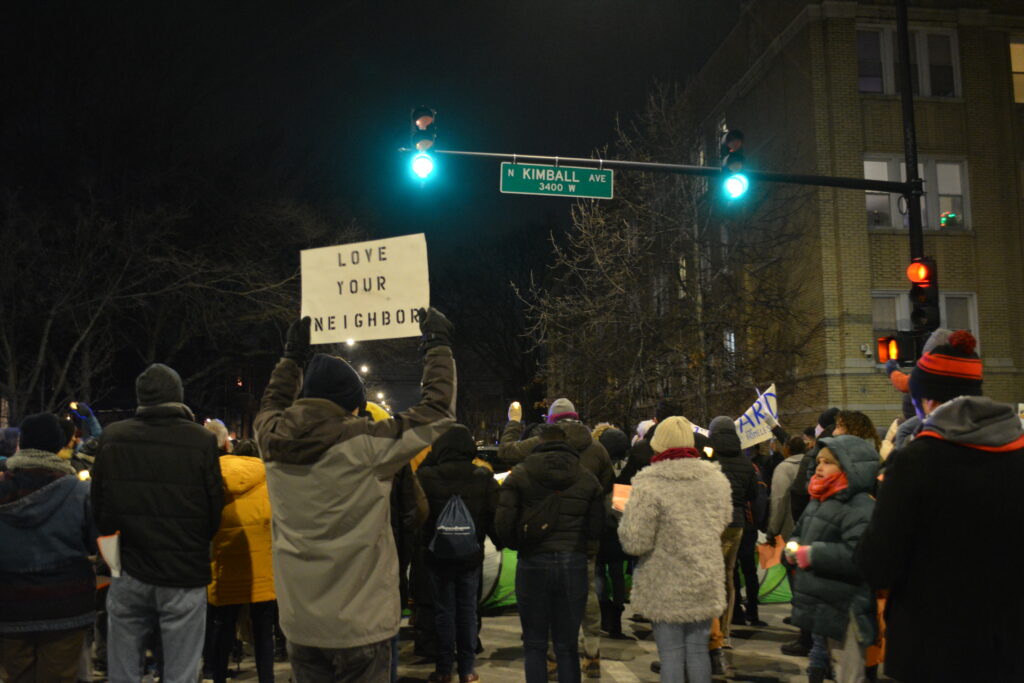
By Niya K. Kelly, Director of State Legislative Policy, Equity and Transformation
WTTW: Firsthand, Brian
FIRSTHAND is a local public television program presented by WTTW. Aired 02/19/24.
Brian walked into St. Leonard’s Ministries with the goal of leaving homelessness behind him. He’s taking advantage of his new life and repairing broken family relationships after years of couch surfing and sleeping in vehicles. Brian is making his voice heard through advocacy work with the Chicago Coalition for the Homeless.
